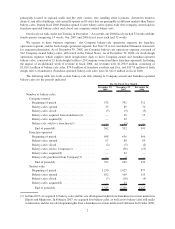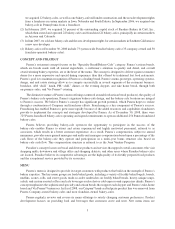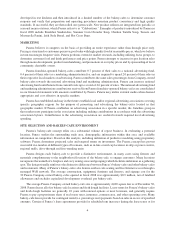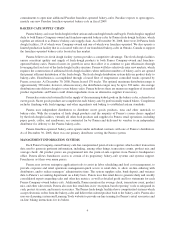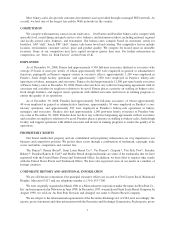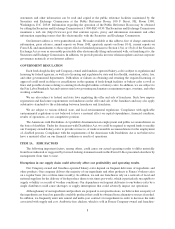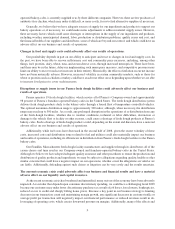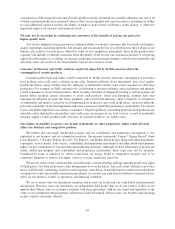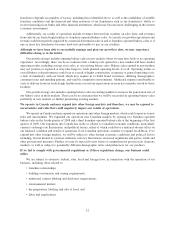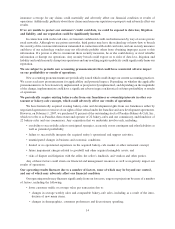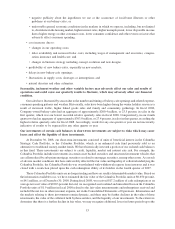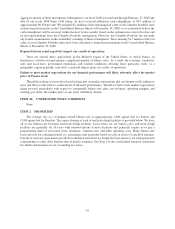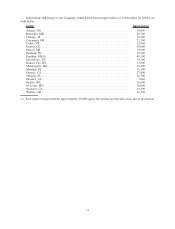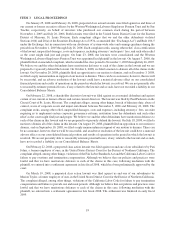Panera Bread 2008 Annual Report Download - page 19
Download and view the complete annual report
Please find page 19 of the 2008 Panera Bread annual report below. You can navigate through the pages in the report by either clicking on the pages listed below, or by using the keyword search tool below to find specific information within the annual report.franchisees depends on a number of factors, including those identified above, as well as the availability of suitable
franchise candidates and the financial and other resources of our franchisees such as our franchisees’ ability to
receive financing from banks and other financial institutions, which may become more challenging in the current
economic environment.
Additionally, our results of operations include revenues derived from royalties on sales from, and revenues
from sales by our fresh dough facilities to, franchise-operated bakery-cafes. As a result, our growth expectations and
revenue could be negatively impacted by a material downturn in sales at and to franchise-operated bakery-cafes or if
one or more key franchisees becomes insolvent and unable to pay us our royalties.
Although we have been able to successfully manage and plan our growth to date, we may experience
difficulties doing so in the future.
Our growth strategy includes opening bakery-cafes in new markets where we may have little or no operating
experience. Accordingly, there can be no assurance that a bakery-cafe opened in a new market will have similar
operating results, including average store sales, as our existing bakery-cafes. Bakery-cafes opened in new markets
may not perform as expected or may take longer to reach planned operating levels, if at all. Operating results or
overall bakery-cafe performance could vary as a result of higher construction, occupancy or general operating costs,
a lack of familiarity with our brand which may require us to build brand awareness, differing demographics,
consumer tastes and spending patterns, and variable competitive environments. Additional expenses attributable to
costs of delivery from our fresh dough facilities may exceed our expectations in areas not currently served by those
facilities.
Our growth strategy also includes opening bakery-cafes in existing markets to increase the penetration rate of
our bakery-cafes in those markets. There can be no assurance that we will be successful in operating bakery-cafes
profitably in new markets or further penetrating existing markets.
We operate in Canada and may expand into other foreign markets and therefore, we may be exposed to
uncertainties and risks that could negatively impact our results of operations.
We operate in Canada and may expand our operations into other foreign markets, which could expose us to new
risks and uncertainties. We expanded our operations into Canadian markets by opening two franchise-operated
bakery-cafes in the fourth quarter of 2008 and a third franchise-operated bakery-cafe at the beginning of the first
quarter of 2009. Our expansion into Canada has made us subject to Canadian economic conditions, particularly
currency exchange rate fluctuations, and political factors, either of which could have a material adverse effect on
our financial condition and results of operations if our Canadian operations continue to expand. In addition, if we
expand into other foreign markets, we will be subject to other foreign economic conditions and political factors
including, but not limited to, taxation, inflation, currency fluctuations, increased regulations and quotas, tariffs and
other protectionist measures. Further, we may be exposed to new forms of competition not present in its domestic
markets, as well as subject to potentially different demographic tastes and preferences for our products.
If we fail to comply with governmental regulations or if these regulations change, our business could
suffer.
We are subject to extensive federal, state, local and foreign laws, in connection with the operation of our
business, including those related to:
• franchise relationships;
• building construction and zoning requirements;
• nutritional content labeling and disclosure requirements;
• environmental matters;
• the preparation, labeling and sale of food; and
• labor and employment.
12


